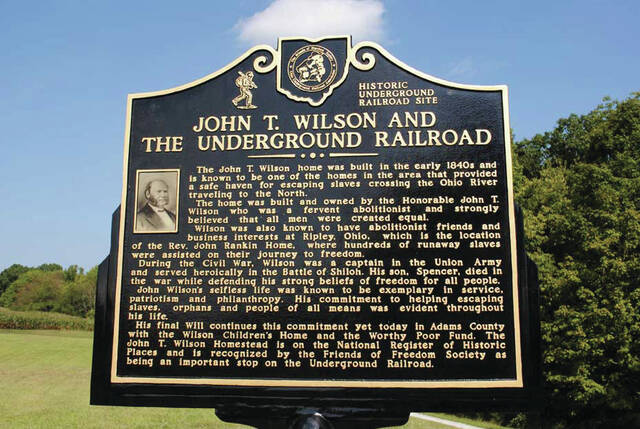By Ryan Applegate
People’s Defender
The recent addition of the John T. Wilson Homestead in Tranquility, Ohio, to the National Park Service’s National Underground Railroad Network to Freedom Program represents a significant recognition of Adams County’s historical role in the Underground Railroad. As one of 14 new listings added to the program, the Wilson Homestead joins over 800 sites across the U.S. and Canada, honoring the courage of freedom seekers who fled slavery and those who supported them on their perilous journeys toward liberty.
The John T. Wilson Homestead is the last remaining Underground Railroad-associated structure in the area and has long been a treasured historical landmark. Built in 1844 by Congressman John T. Wilson, the homestead was both a home and a sanctuary for those escaping bondage.
Wilson’s involvement in the Underground Railroad was widely documented by national and local historians, including Professor Wilbur H. Siebert and Nelson W. Evans. As Megan McCarty, Social Studies Department Chair at West Union High School, noted, “Wilson’s homestead stands as a testament to the individuals who risked their lives to seek freedom and to those who dared to help them.”
Joining the National Park Service’s Network to Freedom Program has profound implications for the homestead’s preservation and educational potential. This designation not only highlights Adams County’s historical importance in the fight against slavery but also offers an opportunity to increase public awareness of the Underground Railroad’s Appalachian routes. McCarty, who has been involved in researching local Underground Railroad history, emphasized, “This is more than just adding a landmark to a list; it’s a reminder to current and future generations of the self-determination and courage that made the freedom network possible.”
The recognition of the John T. Wilson Homestead is part of the Appalachian Freedom Heritage Tourism Initiative, an ambitious project funded by the Appalachian Regional Commission (ARC) and supported by a POWER grant. This initiative seeks to document and promote over two dozen Underground Railroad sites across Ohio, Kentucky, and West Virginia. Besides the Wilson Homestead, other sites recently recognized by the Network to Freedom Program include the historic Allen Chapel AME Church in Portsmouth, Ohio, and the Globe Furnace site in Lynn, Kentucky.
Dr. Andrew Feight, Director of Research for the initiative, underscored the value of this federal recognition, saying, “Our research is recovering important lost chapters of local history that will transform our understanding of the past and help draw interest and visitors to the region.” The initiative’s aim is to foster economic growth in the Appalachian region through historical tourism, while also ensuring these powerful stories of courage and resilience remain accessible to all.
This project is a deeply personal endeavor undertaken by McCarty to preserve an often-overlooked aspect of local history. In her six years of research, she has identified 38 other sites in Adams County alone that were involved in the abolitionist movement, including documented Underground Railroad stations, churches, and the homes of known abolitionists.
While not all these sites served directly as stations, they collectively demonstrate the region’s commitment to the cause of freedom. “Many of these sites have been neglected, but they represent key moments in our history. Preserving them is crucial to understanding both our local identity and our national journey toward justice,” McCarty observed.
The John T. Wilson Homestead’s place in the Network to Freedom is also a reminder of the broader, ongoing pursuit of equality and justice.
National Park Service Director Chuck Sams highlighted the enduring relevance of these stories, stating, “Their brave and tenacious pursuit of freedom from oppression reflects the foundation upon which our nation was built and serves as a reminder that our country’s journey to form a more perfect union is ongoing.”
According to McCarty, this designation opens valuable opportunities for her students and the community. Through presentations, McCarty encourages her audience to reflect on the risks taken by those who helped freedom seekers, posing a thought-provoking question; “If you lived in that time, would you risk your own assets to help someone escape to freedom, or would you take the financial rewards of capturing them?”
As the Appalachian Freedom Heritage Tourism Initiative progresses, sites like the John T. Wilson Homestead will continue to serve as powerful resources for education, reflection, and community pride. The local efforts of Megan McCarty and others in preserving these narratives underscore the importance of local history in shaping our understanding of national values and the universal quest for freedom.





